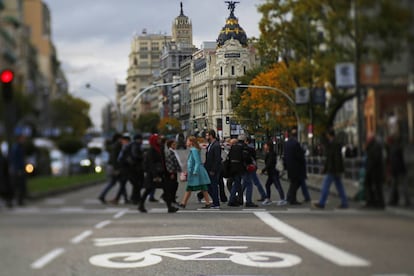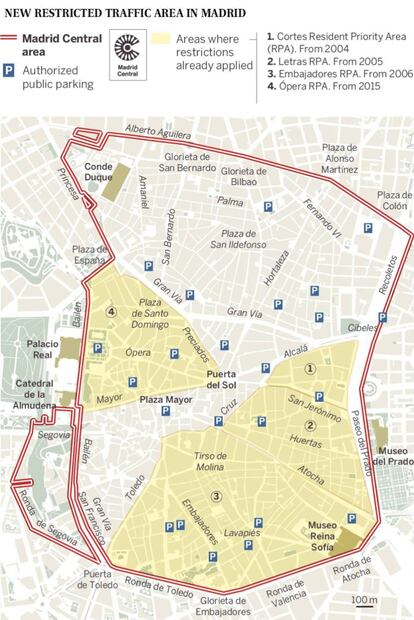Despite risk of EU action, new Madrid mayor puts anti-pollution plan on hold
The new Popular Party-led administration in the Spanish capital will have to decide whether to scrap Madrid Central entirely, or tweak it to avoid sanctions over air quality infringement

Starting on July 1, the city of Madrid will put a recently launched pollution-curbing initiative on hold.
The new mayor of the Spanish capital, José Luis Martínez-Almeida of the conservative Popular Party (PP), has announced a temporary freeze on fines for violators of measures aimed at reducing vehicle emissions in the downtown area. While not officially revoking the plan, the freeze effectively cancels it until an unspecified date.
The EU is not demanding Madrid Central from us, it is demanding efficient results in the fight against pollution
Mayor José Luis Martínez-Almeida
The anti-pollution initiative, known as Madrid Central, was introduced in November 2018 by his predecessor Manuela Carmena. It was widely viewed as a legacy-making project for a leftist leader who had brought 24 years of uninterrupted PP governments in the Spanish capital to an end.
But Almeida made a campaign promise to scrap the scheme if he became the city’s new leader. Instead, the PP wants to go back to an earlier traffic-restriction system based on priority for residents established by former mayor Ana Botella.
A year ago, the Madrid Central project was instrumental in sparing Spain legal action by the European Commission before the EU Court of Justice. At that point, the Spanish capital had been exceeding European pollution thresholds for nearly a decade.
According to EU sources, the proceedings against Spain, triggered by high levels of nitrogen oxides in Madrid and Barcelona, were never fully closed. For now, Brussels has not made any statements and is waiting to see what specific plans the new team in Madrid City Hall comes up with.
The new mayor argues that “the EU is not demanding Madrid Central from us, it is demanding efficient results in the fight against pollution.”
While it is true that the EU has not set out specific policies to adopt, “if [the council] eliminated Madrid Central, the city would have to come up with a plan that is equally restrictive with polluting vehicles, or more so, in order to guarantee air quality,” explains Adrián Fernández, a mobility expert with Greenpeace.
In any case, reversing a plan such as this one would be a first for a major European capital. “It would be the first time,” says Nico Muzi, spokesman for the non-profit group Transporte y Medio Ambiente (Transportation and Environment.) “Besides, the Madrid plan was showing good results.”

A divided council
So far, the municipal council seems divided over the issue. When Carmena’s administration gained approval for Madrid Central – which made 472 hectares of the city center off-limits to traffic except for local residents and public transportation – the right-of-center parties were vocal opponents. The PP and Ciudadanos (Citizens) talked about “chaos,” “inefficiency” and “a disaster.”
The far-right Vox, whose support was essential in getting Almeida into office following the May 26 election, wants to ditch Carmena’s signature project entirely, while Ciudadanos now seems inclined to simply tweak it. “It would not be a good policy to reverse all of Madrid Central,” said Begoña Villacís, who became the deputy mayor at a swearing-in ceremony on Saturday.
Adrián Fernández, Greenpeace
Inefficient
The new administration argues that Madrid Central is inefficient. But the data suggest otherwise: in May, 14 of the 24 monitoring stations in the Spanish capital recorded the lowest levels of nitrogen oxides in a decade. And the only sensor located within the restricted traffic area showed a 48% drop.
“There have been global improvements, and there has been no spike in pollution outside the low emissions zone,” says a spokesperson for the green group Ecologistas en Acción, which will take the city of Madrid before the EU if it scraps Madrid Central.
Meanwhile, a citizen group that initially opposed the project now seems far less critical of it.
“We don’t want to eliminate Madrid Central; perhaps it is necessary to rename the project,” said a spokesperson for Plataforma de Afectados por Madrid Central, a group made up of local retailers who had originally predicted “the collapse of 17,000 small and medium enterprises in the Centro district of the capital.”
English version by Susana Urra.
Tu suscripción se está usando en otro dispositivo
¿Quieres añadir otro usuario a tu suscripción?
Si continúas leyendo en este dispositivo, no se podrá leer en el otro.
FlechaTu suscripción se está usando en otro dispositivo y solo puedes acceder a EL PAÍS desde un dispositivo a la vez.
Si quieres compartir tu cuenta, cambia tu suscripción a la modalidad Premium, así podrás añadir otro usuario. Cada uno accederá con su propia cuenta de email, lo que os permitirá personalizar vuestra experiencia en EL PAÍS.
¿Tienes una suscripción de empresa? Accede aquí para contratar más cuentas.
En el caso de no saber quién está usando tu cuenta, te recomendamos cambiar tu contraseña aquí.
Si decides continuar compartiendo tu cuenta, este mensaje se mostrará en tu dispositivo y en el de la otra persona que está usando tu cuenta de forma indefinida, afectando a tu experiencia de lectura. Puedes consultar aquí los términos y condiciones de la suscripción digital.








































